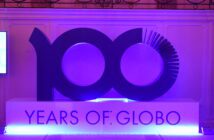Watch this and 27 more MIPCOM and MIPJunior conferences here!
DreamWorks Animation CEO Jeffrey Katzenberg is this MIPCOM’s Personality of the Year, and this afternoon he delivered a keynote speech setting out his theories on the evolving film, television and online video markets.
DreamWorks may be best known for its 27 animated movies, but the company has moved aggressively into television production and distribution too – including a high-profile original content deal with Netflix – and has also acquired YouTube multi-channel network AwesomenessTV.
The keynote struck an optimistic note right from the start. « In the 40 years I’ve been in the entertainment industry, I don’t think there’s ever been a time filled with so much new and unique opportunity for the world of television… But the reality is that everything about opportunity isn’t always simple or easy, » he said.
« Opportunity involves risk. And, in many instances, it feels threatening. This is because a lot of people see the world as a zero-sum game. According to this view, if one person seizes a new opportunity, then someone else has to lose ground. »
Katzenberg cited a quote from Intel’s Sean Maloney in 2007 claiming traditional TV models were about to « completely unravel », and noted that since then TV viewing has not only maintained its existing levels, but has grown.
« So, it seems that all the zero-sum thinkers maybe should reconsider their math. Yes, there will continue to be exponential growth of Internet-delivered content, but linear TV will continue to do just fine, » he said. « And I think I can prove it to you. »
Katzenberg took a whiz-stop tour of the last 550 years of the media business, from Gutenberg’s printing press in 1445, via the first newspaper 150 years later, and then film, radio, television and the web.
« If people like Sean Maloney were to be right in their predictions that the Internet will render linear television obsolete, then this would go against the entire half-millennium history of mass media, » said Katzenberg. « Throughout this history, in not one instance did a new form of mass media replace an earlier form. »
He cited historian Daniel Boorstin’s theory of « displacive fallacy » – the belief that every new technology will replace the last one, whereas in fact each technology gives a new role to the ones that have gone before it.
Katzenberg talked about DreamWorks’ strategy in the light of this, where it continues to produce movies and series for linear TV channels, while also striking « the biggest first-run deal in Netflix history » earlier in 2013, for more than 300 hours of original content.
« Because there are so many emerging distribution options, there will inevitably be more demand for content, » said Katzenberg, framing this as the driving force behind DreamWorks’ acquisitions of entertainment rightsholder Classic Media and YouTube multi-channel network AwesomenessTV.
« Awesomeness has already signed up over 180,000 channels, and aggregated over 25 million subscribers and almost two billion video views – all of this in less than a year. As of August, Awesomeness had over 60 million unique monthly viewers, » said Katzenberg.
« The Awesomeness deal gets us directly in touch with our teen audience in a way that we simply can’t with movies or TV shows. »
Katzenberg said that this may be « breathtakingly new », but on the other hand isn’t new at all. He coined his own theory to build on Boorstin’s displacive fallacy too: « the Parfait Paradigm ».
Parfait? As in the quote from Donkey in Shrek – « Everybody likes parfaits … parfait’s gotta be the most delicious thing on the whole damn planet! » – which Katzenberg related to the way « each new medium gives us qualities that are complementary to the media that were already in place … just like an additional layer in a parfait… the entire media experience simply becomes richer and more satisfying. »
Katzenberg went on to talk about mobile entertainment, which he pitched as the solution to « one of the greatest problems of the 21st century: waiting » as well as being a rich new layer for that media parfait.
« Up until very recently, we literally twiddled our thumbs while we waited. There was nothing else to do. Now our thumbs have a higher purpose than to twiddle. Through touch screens, we actually now can touch the world, » he said. « Thanks to these devices, waiting as we know it is dead. »
Katzenberg argued that this makes mobile an asset to traditional TV rather than a threat, casting minds back to the 1950s, when television was seen as a threat to the movie business, and then to the 1970s, when under his watch at Paramount, TV show Star Trek spawned a huge film franchise.
« Since then, TV shows from Monty Python to Muppets to Mission: Impossible have demonstrated the crossover value of TV to movies, » said Katzenberg. « This same crossover phenomenon is already happening in the relationship between mobile and linear TV. »
He cited the example of AwesomenessTV creating a show that aired on Nickelodeon, compiling some of the best clips from its YouTube channel.
« In this way, mobile isn’t just complementary to linear, it can serve as an incubator of talent and concepts, and then can actually drive additional traffic to traditional TV, » said Katzenberg.
What worries him about this new (or not so new) world? Katzenberg said he sees one key limiting factor that the whole industry must grapple with: the fact that great storytelling is what drives success, yet great stories and storytellers are hard to come by.
« Storytelling – in any medium – is very difficult, and great storytellers are difficult to find. In Elizabethan England, there were lots of playwrights, but pretty much only Shakespeare’s work has endured, » he said.
Katzenberg suggested that the TV industry should think about the recent success of Netflix in this regard. « What’s amazing isn’t just its streaming technology or its subscription-based business model, » he said.
« What’s amazing is that Netflix was able to consistently find and produce great stories, with shows like House of Cards, Arrested Development, Orange is the New Black… Any TV service – network, cable or over-the-top – would have had success with these shows. »
Katzenberg hailed AwesomenessTV boss Brian Robbins as « a natural storyteller himself » in these traditions. « AwesomenessTV is telling short-form stories that kids love and then want to share those stories with their friends. and that is what makes it awesome, » he said.
« Whether the media is old or the media is new, content continues to reign as king. And this is because – like all royalty – it is rare. »
One of the surprises in Katzenberg’s speech came when he praised one of his former employers, Disney, for its approach to securing great, timeless and rare content through acquisitions.
« Under Bob Iger’s leadership, Disney’s acquisition of Pixar, Marvel and Lucasfilm has been tremendously applauded in Hollywood and on Wall Street, » he said. « Together, these acquisitions cost upwards of $15 billion, but without question their long-term value will prove to be far, far greater. »
This hastened the climax of Katzenberg’s set speech, as he sought to remind the MIPCOM audience that while technology may be disruptive in its ability to bring content to more people in more ways (and with more business models) than ever, it’s not the whole story.
« While it’s certainly true that the prosumer electronics market has made it possible for anyone to create high-definition imagery, this fantastic equipment does not make it possible for anyone to create high-definition great stories, » he said.
« For that, we need great storytellers, and once their touch is added, touchscreens can take us anywhere and everywhere. »
Katzenberg was then rudely interrupted by Donkey, who appeared on the Grand Auditorium screen to usher in the Q&A section of the keynote, although not before telling the audience that « I’ve heard just about enough of this content is king crap! »
Journalist Kate Bulkley provided the questions. Why TV, and why now? « There’s a moment that happened for us a couple of years ago, » he said, referring to the realisation that DreamWorks had a strong, recognised brand, it set out to diversity the company and capitalise on that brand.
« In terms of branded entertainment, there was up until then one company which had achieved brandhood as an entertainment brand, and that was Disney, » he said. « The first natural place to diversify was television. A place that many of the leadership of our company had worked in before. »
Is the film business model broken? « It’s not broken for us, » he said. « Things have come along to challenge what had been a very strong business model for 15-20 years, which was really the transition from DVD to digital. So there’s no question that it has had its challenges, but we’ve now made 20 CG animated movies, 19 of which have been profitable. The average box-office gross of those 20 movies is over $500m dollars… We’re doing okay! »
Katzenberg described films as the heart and soul of DreamWorks, but suggested it will be a very different company in five or 10 years’ time, with television just the most transparent place this is showing now. « Location-based entertainment, and theme park business, and China… in a number of places we are really branching out, » he said.
Katzenberg accepted that DreamWorks is under pressure to deliver hits through its Netflix deal: it’s his intention to fulfil the entire five-year deal: « And every one of those shows needs to be exceptional, » he said, claiming that the shows will have comparable budgets to rival shows on channels like Nickelodeon, Cartoon Network and Disney Channel.
How about Amazon, Hulu, Microsoft’s Xbox? « I’m interested in making sure we take the 1,000 episodes that we are producing in a very short period of time, and making sure we do an outstanding job on that. I’m not sure we need to start spinning an additional seven plates! »
He did note that the Netflix deal is for SVOD rights only: when the shows come off that, they can go elsewhere, meaning DreamWorks will be accumulating a significant library of animated content in a short period of time.
Does DreamWorks need to buy more libraries like Classic Media? Katzenberg preferred to talk about how it plans to reinvent the characters and brands and reinvent them for modern viewers.
The conversation turned to AwesomenessTV, which Katzenberg predicted will be a harbinger of big things to come for the television industry in producing « bits, bytes and snacks » to fill those waiting moments. « We used to fill it with Tetris. Now we’re going to fill it with rich media, » he said. « To fill this space that exists is this enormous, enormous, enormous untapped opportunity. »
Katzenberg talked about an idea he’d had: paying the makers of Breaking Bad $25m per episode to make three more episodes running beyond the recent finale. « I have one criteria: you have to deliver them to me in six-minute segments, » he said.
« I said ‘I’m going to create the greatest pay-per-vew television event for scripted programming that anybody’s ever done’. Every day for 30 days you’ can buy a chapter of these 30 chapters… There was absolutely no doubt in m mind there were 6, 7, 8m people who would go out and buy those episodes. At 12 noon when you post it, everybody would be waiting for those six-minute episodes to come. »
Katzenberg talked about the idea of a platform for entertainment based on mobile devices and killing time in this way. « The higher the quality of the stuff that fills it, the higher people will be paid for the work that they’re doing there… Right now too many people are thinking of it as cats on skateboards. »
So shortform video isn’t going to kill storytelling? « No! Any more than television killed movies. It didn’t happen, no. »
Katzenberg added that AwesomenessTV won’t be forced to use specific DreamWorks properties or production tools, praising the company’s founders. « Show me anybody working in shortform content today that touches the quality of the work that they’re doing, » he said. « Their challenge is they have to scale it, and quickly. It’s not like it’s not obvious what they’re doing. Other talented people are going to come along and see this opportunity. »
So if DreamWorks IP can help in that scaling process, it’ll be made available, but that’s not why DreamWorks bought the company. He talked instead about the potential for AwesomenessTV shows like the upcoming Side Effects to eventually graduate to being longform, linear TV shows.
« Not only is he delivering them a truly tested concept, cast and idea, he’s going to deliver an audience, » said Katzenberg. « In five years we’re gonna come back, and there’s going to be MIPCOM Waiting, the waiting space: the thumb-twiddling replacement business! »
He also talked about the way children’s media habits are « radically changing », and that the industry can only understand it by watching them. « They’re not going to their television set to watch. It’s not that they’re not watching, it’s that that’s not the device. Today, these kids are engaged in this much more personal experience that happens when they’re on an iPad or tablet. »




